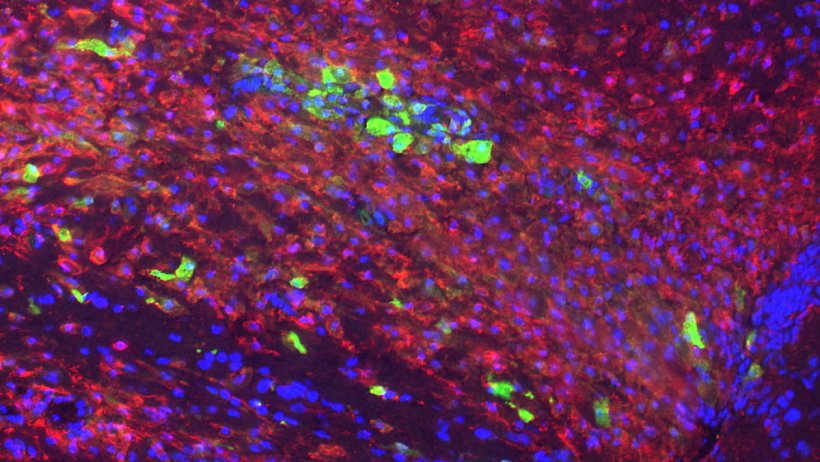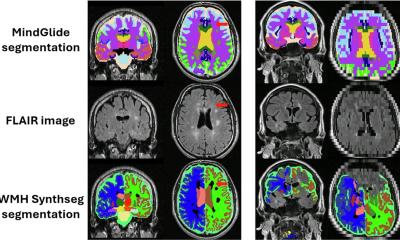
Image source: Inserm; © Zahaf et al.
News • Understanding the role of sex hormones
Multiple sclerosis: Why are women affected more often?
Multiple sclerosis (MS), an autoimmune disease for which there is no cure as yet, affects three women for every one man. Faced with this observation, scientists are studying the role of the sex hormones in order to better understand the differences between men and women in relation to the disease and its progression.
A team led by Inserm researcher Elisabeth Traiffort in Unit U1195 “Diseases and hormones of the nervous system” (Inserm/Université Paris-Saclay) has recently shown that although male hormones – androgens – are present at very low levels in women, their presence is necessary to regenerate the myelin sheath which is destroyed in MS. These findings have been published in Nature Communications.
Multiple sclerosis is an autoimmune disease. In its most common form, relapsing-remitting MS, which accounts for 85% of cases, it manifests as inflammatory flares during which the patient’s immune cells attack and destroy the myelin in the central nervous system. This phenomenon causes lesions that lead to motor, sensory, and visual disorders. These symptoms are reversible at the beginning of the disease, thanks to the spontaneous repair of the destroyed myelin. However, over time, symptoms gradually become irreversible, reflecting the failure of the repair process, marking entry to the progressive phase of the disease. While current treatments reduce the frequency and severity of the inflammatory flares, thereby improving patient quality of life, they remain ineffective against the progression of the disease.
Our data suggest the use of appropriate doses of androgens in women with MS and the need to consider the patient’s sex when treating this and in all likelihood other conditions involving the destruction of myelin in the central nervous system
Elisabeth Traiffort
Current research aims to gain a better understanding of the mechanisms of the disease and develop new therapeutic avenues that would prevent patients from entering the progressive phase, particularly by promoting the regeneration of myelin. Inserm researcher Elisabeth Traiffort and her team at the “Diseases and hormones of the nervous system” unit are working for example to better understand the differences between women and men in MS, in order to determine whether it could be beneficial or even necessary to adapt therapeutic management to the patient’s sex. Remember that the disease is predominantly female, since three out of every four patients are women.
While the hormonal environments of men and women are very different, they cannot be restricted to high androgen levels in men and fluctuating levels of estrogen and progesterone in women. We know that men also produce estrogens, particularly in the brain where an enzyme is found that converts androgens into estrogens, while women produce small amounts of androgens. It was on this last aspect that Inserm researcher Traiffort and her colleagues focused their latest study.
Research has already shown that androgens protect neurons in the central nervous system of men with relapsing-remitting forms of MS and induce the regeneration of myelin sheaths destroyed in males, in animal models of the disease. But what is the role of the small amounts of androgens that are also found in the central nervous system of women? Can these androgens present at much lower levels than in men also impact the progression of the disease in female patients?
The scientists worked with animal models of the disease and also on tissues from patients supplied by organ donation banks. They first showed that in regions where myelin is destroyed, the AR receptor that enables androgens to transmit their signal is strongly expressed in the nervous tissue of women with MS, as it is in the female mouse models of the disease. This observation would suggest the existence of an essential role of androgens in the demyelinated tissue of the affected women.
In accordance with this hypothesis, the scientists have shown that despite only being present in small quantities in female mice, androgens still have a beneficial effect on the optimal regeneration of the destroyed myelin. Indeed, when the signals transmitted by the androgens are completely absent, this regeneration is greatly reduced.
Finally, other findings in animals and in human tissues suggest that these same androgens also have major anti-inflammatory effects on demyelinated nerve tissue in females unlike what is observed in males. The beneficial effects of androgens in women with MS could therefore also be linked to a decrease in the level of local inflammation, in areas where myelin is destroyed. This finding is interesting if we consider the current hypothesis that disease progression could be closely associated with the inflammatory cells residing in nervous tissue. “While the low levels of androgens detected in women could point to a minor role for these hormones in the disease, we show that this is not the case. Our data suggest the use of appropriate doses of androgens in women with MS and the need to consider the patient’s sex when treating this and in all likelihood other conditions involving the destruction of myelin in the central nervous system,” concludes Traiffort.
Source: Inserm
06.04.2023











